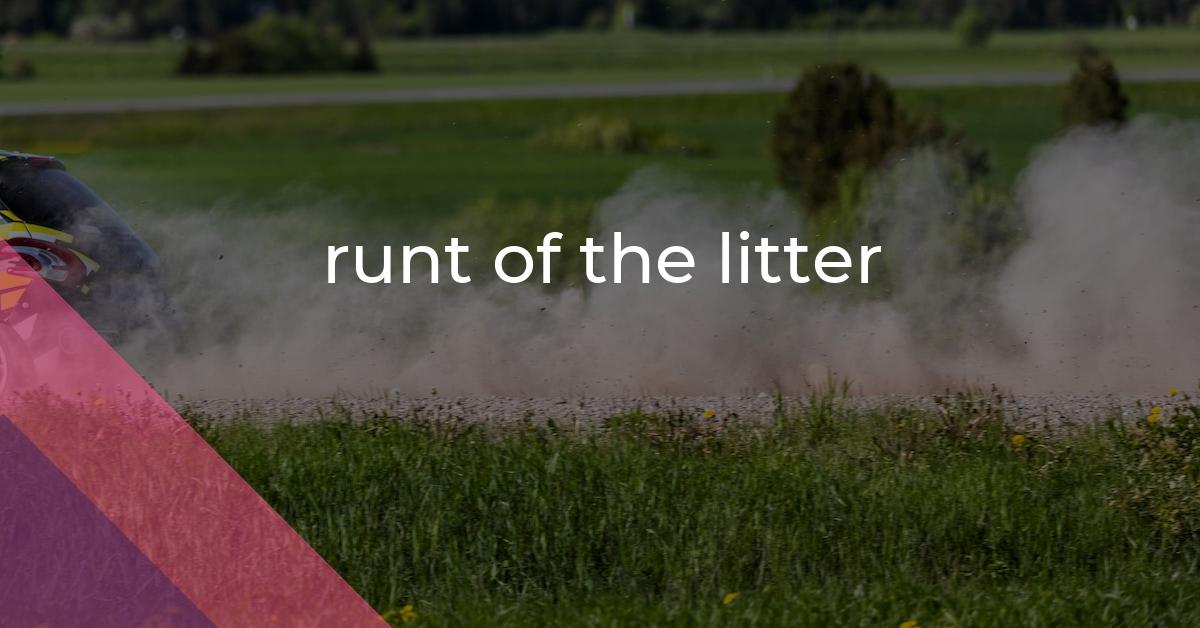runt of the litter: Idiom Meaning and Origin
What does ‘runt of the litter’ mean?
The idiom "runt of the litter" refers to the smallest or weakest member of a group or family. It is often used to describe someone or something that is perceived as less successful or capable compared to others.

Idiom Explorer
The idiom "short end of the stick" refers to being in a disadvantaged or unfavorable position, often due to unfair treatment or circumstances beyond one's control.
"Run rampant" is an idiom that means to spread or grow quickly and uncontrollably, often in a negative or destructive way.
The idiom "run out of town" means forcibly expelling or driving someone away from a place due to dislike or disapproval.
The idiom "run out" means to exhaust the supply of something or to reach the end of a limited resource. It implies that there is no more of that specific thing available.
The idiom "run off with" means to leave quickly and unexpectedly with someone or something, often in a secretive or unauthorized manner. It implies a sense of impulsiveness and abandonment, suggesting a departure without prior notice or agreement.
The idiom "run off" means to leave quickly or flee.
The idiom "run into the ground" means to exhaust or use up completely, often through overuse or mismanagement.
The idiom "run in the family" means that a certain trait, characteristic, or talent is common among the members of a family, indicating a strong genetic or hereditary influence.
The idiom "run a risk" means to take a chance or engage in an activity that could have negative consequences or uncertain outcomes.
FAIL
The idiom "runt of the litter" has a specific meaning within the context of animal breeding and is often used metaphorically to describe a person or thing that is considered to be smaller, weaker, or less successful than others in a group. It emphasizes the disparity between individuals and highlights the concept of being the smallest or the least favored.
The origin of this idiom can be traced back to the literal definition of "runt" which refers to the smallest, weakest, or least viable offspring in a litter of animals, particularly in the case of dogs or pigs. This term has been in use since the 17th century and was commonly applied to puppies or piglets that were significantly smaller in size and less robust than their siblings. The word "runt" itself derives from the Middle English word "runtling," which means "neat little creature."
Over time, the term "runt of the litter" extended its usage beyond the animal breeding sphere and has become a popular idiom in the English language. It is now used metaphorically to convey the notion of inferiority, weakness, or underdevelopment in various scenarios. The idiom suggests that the small or weak entity is at a distinct disadvantage compared to the others in a group, often implying that it will struggle to compete or succeed.
One possible reason for the enduring popularity of this idiom is its relatability and use as a universal metaphor. The concept of a "runt" elicits empathy and sympathy from individuals who have experienced feelings of inadequacy or have observed similar situations of inequality. It serves as a reminder of our instinctive desire for fairness and justice, as well as our recognition of the challenges faced by those who are perceived as being less fortunate.
Focusing on related idioms, "pick of the litter" contrasts with "runt of the litter" as it refers to the best or most desirable choice from a group of options. This idiom conveys a sense of superiority or excellence, highlighting the notion of being the top selection. In a litter of puppies, for example, the "pick of the litter" would be the healthiest, strongest, and most desirable puppy.
The idiom "run in the family" is also related to the concept of the "runt of the litter." It refers to the tendency for certain traits or characteristics to be shared among family members, often across generations. While the "runt of the litter" focuses on the smallest or least successful member of a group, "run in the family" suggests that certain qualities or conditions are prevalent within a specific family lineage.
Another related idiom is "common run," which can be used to describe the average or ordinary members of a group. While the "runt of the litter" signifies the least favored or weakest entity, the "common run" refers to the standard or typical individuals within a larger set. The idiom "common run" emphasizes the prevalence of average or ordinary characteristics.
The idiom "best of the bunch" is a direct contrast to the "runt of the litter." It denotes the superior or most outstanding member within a group. In relation to a litter of puppies, the "best of the bunch" would represent the healthiest, strongest, and most desirable puppy. The idiom conveys a sense of excellence and distinction, highlighting the superiority of that particular individual.
Lastly, the idiom "bottom of the line" can be linked to the concept of the "runt of the litter" as it signifies the lowest or least desirable option within a group. While the "runt of the litter" focuses on the smallest or least successful entity, "bottom of the line" suggests that a particular choice or option is at the bottom or end of the hierarchy.
While the idiom "runt of the litter" has a clear meaning and usage, there is room for interpretation and reflection on its broader implications. It raises questions about the nature of competition, fairness, and the impact of perceived disadvantages on individuals and societies. The idiom invites us to consider the dynamics of power, success, and the potential for overcoming adversity. In this way, it serves as a catalyst for introspection and an opportunity to explore the complexities of human experience.
Example usage
Examples of how the idiom *runt of the litter* can be used in a sentence:
- The smallest puppy in the litter is often referred to as the runt of the litter.
- Although he was the runt of the litter, the tiny kitten had the most playful personality.
- Despite being the runt of the litter, the horse eventually grew up to be the fastest in the racing competition.
More "Animals" idioms



